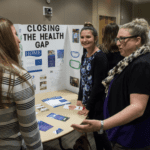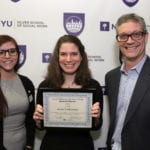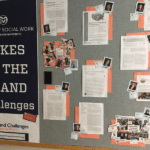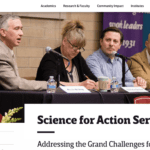On Campus
Many schools of social work are embracing the Grand Challenges and integrating them throughout their programs (check out our infographic here). In January 2019, the GCSW published a paper, “Starting the Conversation: Approaches to Integrating the Grand Challenges into Social Work Academic Programs,” which featured work at Catholic University of America, National Catholic School of Social Service; Colorado State University, School of Social Work; University of Chicago School of Social Service Administration; and University of Southern California, Suzanne Dworak-Peck School of Social Work. Below are additional exemplars.
If you or your school is active in integrating the Grand Challenges into your program, please email us.
 Universities can organize their faculty’s research and work by the Grand Challenges for Social Work. The University of Pittsburg School of Social Work, Loyola University of Chicago School of Social Work, University of Alabama School of Social Work, and University at Buffalo School of Social Work celebrate and promote how their faculty work relates to the each of the Grand Challenges.
Universities can organize their faculty’s research and work by the Grand Challenges for Social Work. The University of Pittsburg School of Social Work, Loyola University of Chicago School of Social Work, University of Alabama School of Social Work, and University at Buffalo School of Social Work celebrate and promote how their faculty work relates to the each of the Grand Challenges.
Wayne State University School of Social Work has committed to the Grand Challenges initiative through it’s own 10 year effort, Rising to the Challenge. As part of this effort, the School of Social Work has showcased the innovative ways their faculty, staff and students are conceptualizing the Grand Challenges within the context of their home in, and service to, Greater Detroit.
The University of Southern California Suzanne Dworak-Peck School of Social Work offers a Doctor of Social Work program framed around the Grand Challenges for Social Work. DSW students complete a capstone project that proposes an innovative, actionable solution to one of the Grand Challenges. The Grand Challenges are integrated throughout the program’s curriculum to frame
The Doctor of Social Work faculty at California Baptist University developed a framework designed to help social workers identify specific social problems and partner with communities to create socially innovative solutions. The Community Engagement and Social Innovation (CESI) Model is an eight-phase framework to systematically tackle the Grand Challenges of Social Work, incorporating best practices and literature from social work and other disciples focused on community-based practice and research to identify, collaborate, and innovate for social good.
Inspired by the Grand Challenges, Valerie Bryan, PhD, Associate Professor, University of South Alabama, transformed her BSW macro practice class, using problem-based learning to investigate a number of the Grand Challenges. “We discovered that investigating three of the Grand Challenges was just the perfect number for a semester-long class, interspersed with lecture on community assessment and intervention strategies,” she notes. For more information or and materials, contact Dr. Bryan.
 Western Carolina University’s Department of Social Work incorporated the Grand Challenges into its Bachelor of Social Work curriculum and field placements: Early in the semester, students learned about the Grand Challenges and had in-class discussions about the ways their field agencies are working to address one or more of the challenges. Each student then chose one challenge on which to focus, answered a series of questions about their agency and the challenge, and created a poster presentation to share information about the work they had been involved in. For more information, contact Katy Allen, MSW, Assistant Professor & Director of Field Education .
Western Carolina University’s Department of Social Work incorporated the Grand Challenges into its Bachelor of Social Work curriculum and field placements: Early in the semester, students learned about the Grand Challenges and had in-class discussions about the ways their field agencies are working to address one or more of the challenges. Each student then chose one challenge on which to focus, answered a series of questions about their agency and the challenge, and created a poster presentation to share information about the work they had been involved in. For more information, contact Katy Allen, MSW, Assistant Professor & Director of Field Education .
The Council on Social Work Education (CSWE) offers curricular guides related to several of the Grand Challenges for Social Work. Several of our network leads participated in, or led, the development of these guides. The curricular guides serve as supplemental guides for programs and educators on relevant topics in social work and provide full descriptions of in-class exercises and assignments. Each resource is produced by a task force of national content experts. Here are a few of the guides that relate to the Grand Challenges: Curricular Guide for Environmental Justice, Curricular Guide for Addressing Homelessness, Specialized Practice Curricular Guide for Gero Social Work Practice, Curricular Guide for Economic Well-Being.

The Silver School of Social Work held the #NYUSilverUp4TheChallenge Student Competition, inspired by the Grand Challenges for Social Work initiative. Anna Nathanson, MSW ’19, was named the Grand Challenges for Social Work Scholar for her concept addressing the “End Homelessness” challenge with a focus on how New York City can take an anti-racist stance in its efforts towards eviction prevention.
The event was the culmination of a seven-month-long, student-led competition, which was launched by the Silver School at the start of the academic year to inspire students at both the undergraduate and graduate levels to apply the core social work values to address one or more of the pressing social issues in the Grand Challenges for Social Work initiative. It was co-created by Class of 2019 MSW students Mary Burns and Elijah Thompson, and coordinated by Burns throughout the academic year under the guidance of the School’s Office of Student Affairs. “We believe our Grand Challenges student competition is the first of its kind among schools of social work, and we are proud to have led the charge,” said Dr. Neil Guterman, Dean and Paulette Goddard Professor of Social Work and Grand Challenges Executive Committee member. “We hope it inspires other schools to engage with the Grand Challenges to strengthen the profession.” Pictured left to right: Mary Burns, Anna Nathanson and Dean Guterman.
 In recognition of the importance of partnerships to advance the Grand Challenges for Social Work, Colorado State University’s School of Social Work took a fresh approach to building awareness of the Grand Challenges using the GC icons to associate faculty members and their research with the GCSW to build momentum on a grassroots level among students, and helping students to see how faculty research work—and perhaps even visualize how their own work—has an impact.
In recognition of the importance of partnerships to advance the Grand Challenges for Social Work, Colorado State University’s School of Social Work took a fresh approach to building awareness of the Grand Challenges using the GC icons to associate faculty members and their research with the GCSW to build momentum on a grassroots level among students, and helping students to see how faculty research work—and perhaps even visualize how their own work—has an impact.
Colorado State University also hosted the Western Consortium for the Grand Challenges for Social Work in September 2019, featuring the development of partnerships between communities and universities and highlighted models for success in achieving shared goals. Note: Read more about GCSW efforts at Colorado State University in this 2019 Education Brief.
 To advance progress on Social Work’s Grand Challenges, the Graduate School of Social Work at the University of Denver held a Social Work Grand Challenges Science for Action Series, addressing all of the original challenges over four years. View the recordings of this series here.
To advance progress on Social Work’s Grand Challenges, the Graduate School of Social Work at the University of Denver held a Social Work Grand Challenges Science for Action Series, addressing all of the original challenges over four years. View the recordings of this series here.
The University of Illinois at Urbana-Champaign School of Social Work held a year-long lecture series designed to meet the profession’s Grand Challenge to Harness Technology for Social Good, presenting innovative applications of technology powered by science in order to expand new opportunities and collaborations for reaching more people with greater impact on society’s most vexing social problems.
 The Grand Challenge Networks have a space in Prof2Prof. Professors and administrators encouraged to join and upload their best teaching and learning materials. This is a great opportunity to collaborate across disciplines.
The Grand Challenge Networks have a space in Prof2Prof. Professors and administrators encouraged to join and upload their best teaching and learning materials. This is a great opportunity to collaborate across disciplines.
 The Kentucky Association of Social Work Educators 2019 conference, held on November 15, 2019 and Wichita State University’s 2020 POWER conference, March 5-6, 2020, are themed on the Grand Challenges.
The Kentucky Association of Social Work Educators 2019 conference, held on November 15, 2019 and Wichita State University’s 2020 POWER conference, March 5-6, 2020, are themed on the Grand Challenges.
The University of Washington Office of the Provost and the UW School of Social Work have committed financial support to advance Grand Challenges scholarship. The funds will be used to support graduate student research in Grand Challenge topic areas, deepening the impact of social work innovators and scholars. “The collaborative Grand Challenges approach has energized the field of social work and has led to important innovations that address urgent social problems,” said then-Provost Gerald Baldasty. “At the highest levels of the university, we want to show our support for our graduate students who are committed to this important effort.”
With a generous allocation of funding from Dean Richard P. Barth, PhD, the University of Maryland School of Social Work is is offering a new, competitive dissertation award, in the amount of up to $4,000, to support “Research to Advance a Grand Challenge for Social Work and Society.” PhD candidates are invited to apply for this award by describing how their dissertation study addresses one of the 12 Grand Challenges for Social Work. Dissertation award applications can be found on the UM SSW PhD website under ‘Dissertation Funding.’

